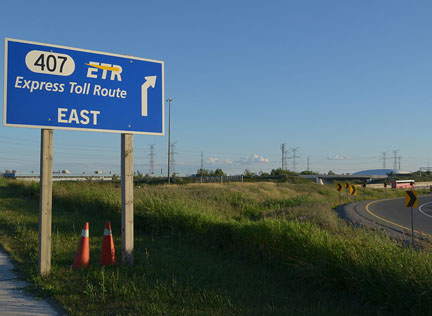An Ontario Superior Court judge has ruled a limitation period should apply for a user of the 407 ETR who failed to pay his bills totalling more than $13,000.

In
407 ETR Concession Co. v. Ira J. Day, Justice Mark Edwards was asked to decide whether a claim against Day for unpaid invoices was statute-barred because of an expired limitation period. The 407 ETR commenced an action against Day in June 2013 seeking to recover amounts owing from 2,914 trips on the Toronto-area toll road.
The 407 ETR argued if there should be no limitation period, it should be either the period set out in the Transponder Lease Agreement signed by Day for use with his Porsche 911 personal vehicle — 15 years, or two years from the date his licence plate went into licence plate denial.
The court ruled that for those who have an Ontario licence plate, the limitation period commences two years from the date the plate of the non-paying consumer is placed into licence plate denial by the Registrar of Motor Vehicles for the Province on Ontario. For out-of-province plates the limitation period should be two years from the date of invoice.
Day’s lawyer Ronald Manes, who argued the limitation period should be two years from the date of the invoice, says he has a mixed reaction to the decision, saying his client has “won the war but lost the battle.”
“In the consumer’s favour it is a big victory because the court found there is a limitation period and the transponder agreement he signed does not apply to a consumer as it’s protected by the Consumer Protection Act, but when the court went on to find the limitation period in his case starts on the date he was placed in plate denial, then the limitation period has not run,” he says.
“The result of the decision seems to be that it is in the 407’s discretion when to initiate the limitation period based on when they see fit to put somebody in plate denial.”
In Day’s case, plate denial happened after the 90-day period.
“The significance of the case is that if the court accepted the 407’s argument it would allow a company to determine when and how the limitation period applies to them which is the antithesis of what the limitation period was supposed to achieve,” says Manes.
“So while the judge rejects there is no limitation period, on the other hand he enables them to determine what their limitation period is via the date they submit plate denial.”
The court ruled that when Day leased the transponder, he did so as a consumer as defined by the Consumer Protection Act and not a business owner. As such, the 407 ETR can’t rely upon the 15-year limitation period set forth in the Transponder Lease Agreement, as the 407 ETR does not fall within the exception set forth in s. 22(5)(1) of the Limitations Act given that it only applies in respect of business agreements.
Lawyers for Day pointed out that if the 407 is entitled to rely on the limitation period of 15 years set forth in the Transponder Lease Agreement and not commence a claim for 15 years, Day would be liable to pay the 407 ETR $289,444.45 on a principal balance of $9,808, given the interest would be accumulating at the compounded rate of 26.82 per cent.
They also argued, by analogy if the 15-year limitation period applied to all outstanding invoices, the 407 ETR would stand to make between $1.5 billion and $4.1 billion as a result of accrued interest.
Manes argued the limitation period commences when an invoice is sent by the 407 ETR to a customer, and not two years after a customer’s licence plate is placed into denial.
Day was placed into licence plate denial on three occasions between August 2008 and November 2010. On each occasion Day paid the amounts owing to the 407 ETR.
He last paid his 407 ETR account in full on Dec. 21, 2010. Since then he has made no payments despite continuing to use the highway on a regular basis. The court heard he travelled on the 407 some 3,700 times since that last payment. The registrar subsequently placed a Mercedes owned by Day into plate denial in June 2012.
The matter is not over yet. Manes says the next step is that the court has to sign an order regarding its direction to the two parties.
At this point, the 407 and Day’s lawyers disagree on how to interpret Edward’s decision and references to “placed into plate denial” and the 407’s reference to being placed into plate denial (when plates actually expire.)
“We will also be taking instruction whether Mr. Day wishes to appeal the decision,” says Manes.
Counsel for the 407 could not be reached for comment before posting.

 In 407 ETR Concession Co. v. Ira J. Day, Justice Mark Edwards was asked to decide whether a claim against Day for unpaid invoices was statute-barred because of an expired limitation period. The 407 ETR commenced an action against Day in June 2013 seeking to recover amounts owing from 2,914 trips on the Toronto-area toll road.
In 407 ETR Concession Co. v. Ira J. Day, Justice Mark Edwards was asked to decide whether a claim against Day for unpaid invoices was statute-barred because of an expired limitation period. The 407 ETR commenced an action against Day in June 2013 seeking to recover amounts owing from 2,914 trips on the Toronto-area toll road.